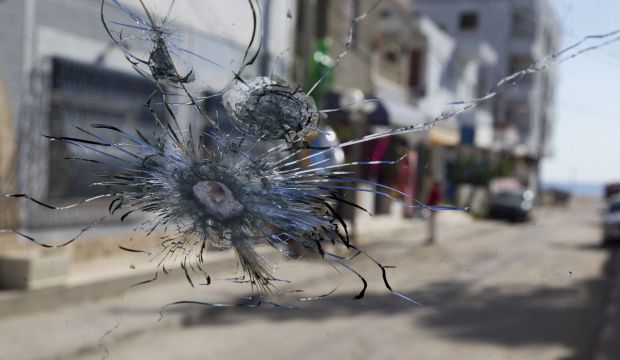
A picture taken on June 27, 2015 shows a bullet-riddled windscreen near the RIU Imperial Marhaba Hotel in Port El-Kantaoui, on the outskirts of Sousse south of the capital Tunis, in the aftermath of a shooting attack on the beach resort claimed by the Islamic State of Iraq and Syria (ISIS). (AFP PHOTO / KENZO TRIBOUILLARD)
The shootings in the Tunisian resort of Sousse happened at about the same time as a bombing at a Shi’ite mosque in Kuwait and an attack on a US-owned factory in France that included a beheading. It was unclear if the violence was linked but it came days after ISIS militants urged their followers “to make Ramadan a month of calamities for the nonbelievers.” In all, the assailants killed at least 65 people.
The SITE Intelligence Group reported later that ISIS claimed credit for the Tunisia attack on its Twitter account and identified the gunman as Abu Yahya Al-Qayrawani.
The attack in Tunisia, the country’s worst ever, comes just months after the March 18 massacre at the national Bardo Museum in Tunis that killed 22 people, again mostly tourists, and has called into question the newly elected government’s ability to protect the country.
“Once again, cowardly and traitorous hands have struck Tunisia, targeting its security and that of its children and visitors,” President Beji Caid El-Sebsi told reporters at the RIU Imperial Marhaba hotel, near the beach rampage site.
El-Sebsi promised “painful but necessary” measures, adding: “No country is safe from terrorism, and we need a global strategy of all democratic countries.”
Rafik Chelli, the secretary of state of the Interior Ministry, told the Associated Press that the attack was carried out by a young student not previously known to authorities. At least 36 people were reported wounded in the shooting spree, which ended when the gunman was shot to death by police.
ISIS claimed responsibility for the suicide bombing at the Shi’ite mosque in Kuwait City that killed at least 27 people and wounded scores of other worshippers at midday prayers—the first such attack in the mostly quiet and relatively secure Gulf Arab nation in more than two decades.
In southeastern France, a man with ties to Islamic radicals rammed a car into a gas factory, touching off an explosion that injured two people. Authorities arriving at the site made a grisly discovery: the severed head of the driver’s employer was found hanging at the plant entrance.
The suspect, Yassine Salhi, was seized by an alert firefighter, authorities said, and French President Francois Hollande said the attacker’s intention had been to cause an explosion. A security alert for the southeast region was raised to its highest level for the next three days, and the US Embassy in Paris warned American citizens to be vigilant.
